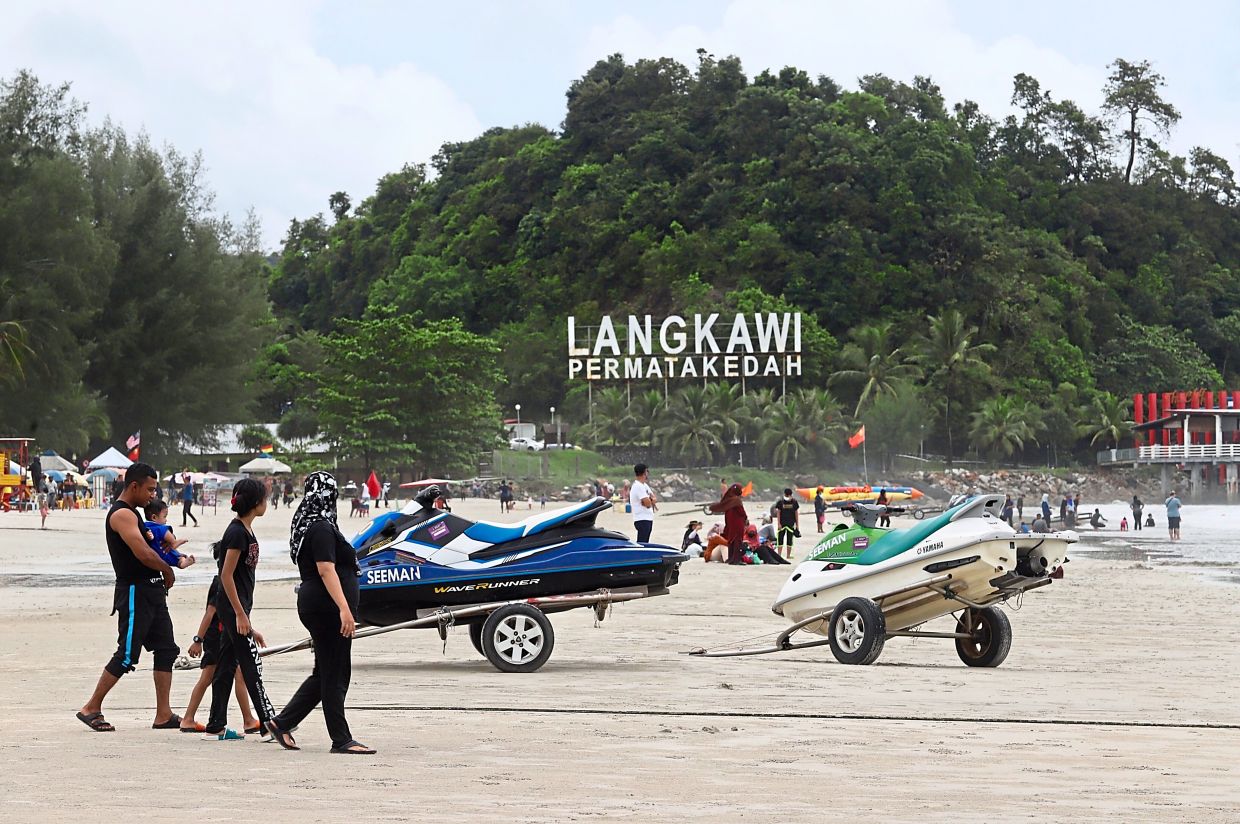
Island retreat: Malaysia is a plural society with people of different beliefs who enjoy visiting Langkawi for holidays.
WHAT irony to read two contrasting news items on the same day – Dubai has scrapped a 30% alcohol tax, ended personal alcohol licences and eased other related measures.
It was reported that the move was believed to be an attempt to make Dubai more attractive to foreigners, in the face of competition from its neighbours.
Saudi Arabia is already heavily promoting music tourism in Jeddah with rave parties featuring top international acts. Dancing, involving the opposite sex, is allowed.
Over here in Malaysia, we read a report about the Kedah PAS-led state government suggesting that the sale of alcohol would be controlled in Langkawi.
It is not an outright directive to ban alcohol yet, but it is enough to frighten off hoteliers, who fear that it will kill the tourism industry as well as the many duty-free outlets run by Malaysians.
Kedah Mentri Besar Datuk Seri Muhammad Sanusi Md Nor had reportedly made the suggestion last November, saying the state government would restrict the sale of alcohol in public including at duty-free shops as well as in rural areas on the mainland.
This comes after the state government ordered the closure of gaming outlets in Kedah.
Business groups and political parties with non-Muslim membership have already said that shutting down legitimate gaming outlets, owned by number forecast operators (NFOs), would only benefit criminals.
Each year, the Federal Government loses about RM2bil in taxes due to illegal gambling.
Muhammad Sanusi has reportedly said that he had instructed local authorities to monitor the relevant premises to ensure no illegal business was being conducted.
Well, it would be the job of the police to nab illegal bookies. Surely these operators are not going to operate openly, and how on earth would the local authorities be able to track them?
Again, there is this irony – illegals are known to take bets on simple WhatsApp messages from their punters but legitimate NFOs are not allowed to go digital by the Finance Ministry. Go figure.
Likewise, such statements by PAS leaders will not help Langkawi tourism. Not everyone goes on a drinking binge and gets drunk, but some visitors prefer a few glasses of wine during meals to make it complete.
Likewise, having a few beers at the beach under the burning sun is just something natural and innocent to many others.
Of course, we know that Muslims are forbidden to drink, and non-Muslim businessmen understand and respect that.
But why impose that on non-Muslims when Malaysia is a plural society? Even minorities have rights, too.
Similarly, if Muslims, as a minority, in Europe and the United States, wish to wear the hijab and build mosques, their religious rights must be respected and supported.
It is a fallacy and a poor argument to claim, as it is often done by PAS leaders, that all religions forbid drinking.
Well, the Bible clearly states that Jesus turned water into wine at a wedding, his first miracle, and wine is used by many churches as part of the communion service, although Ribena is the favourite option in Malaysia.
The key words here are freedom of choice and moderation. Everything that we indulge in must be in moderation.
It is important that our politicians, including from PAS, be aware that investors watch their language when the subject of race and religion crops up. They do not feel comfortable when religion is used as a tool.
Rules are made by these “politician theologians” while investors are more concerned with international values on law and justice than the conservative, religious laws, narrowly interpreted by these people.
Without doubt, PAS is encouraged by its huge wins in the recent general election, and with state elections coming up in six months, we will hear more of such PAS narratives.
To its audience, its leaders would want to be seen as holier-than-thou, although the reality can be entirely different – but then, there are many who believe in what they preach.
These PAS personalities need a study trip to Dubai and Jeddah to see for themselves how the Arabs have moved on.
They know the oil will run out one day when vehicles will run on electricity, a cleaner option. Tourism and financial hubs are low-hanging fruits, and the Arabs are getting ready for that.
So, let’s take it easy, be real and encourage investors and tourists to come here and spend.





